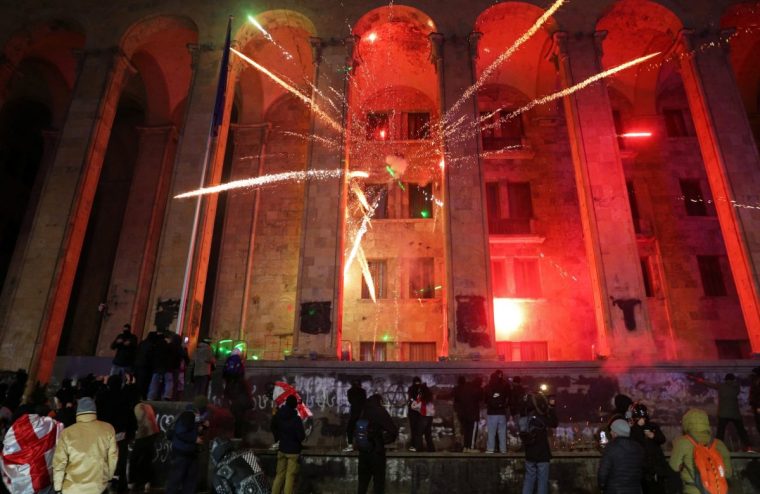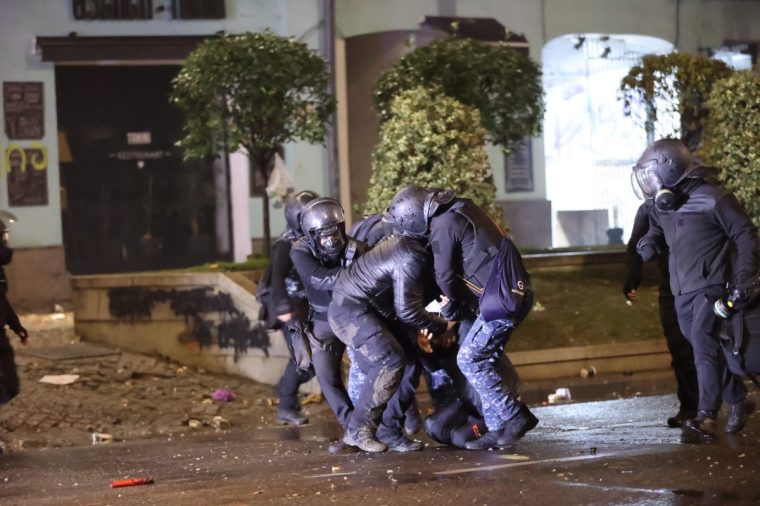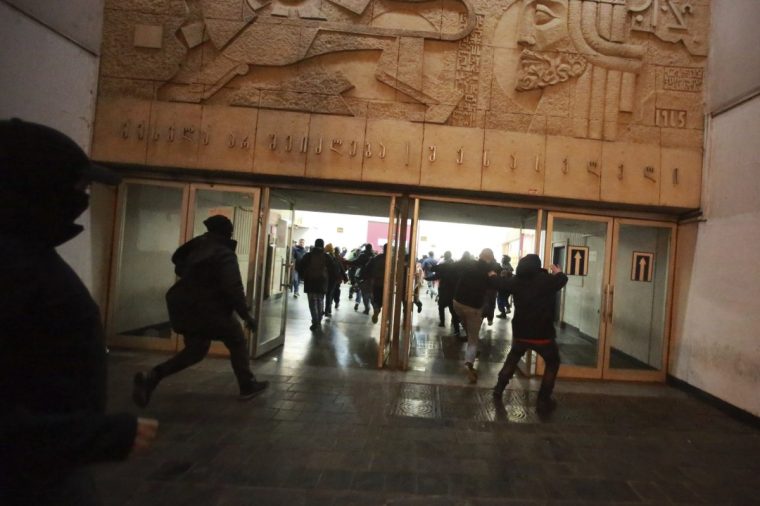In the city of Zugdidi, 78-year-old Luisa Akubardia stood resolute in the cold December air.
This far-western corner of Georgia lies just seven miles from the boundary with Abkhazia, the breakaway region she fled during the early 1990s war with Kremlin-backed separatists.
“We want to be free from Russia, to be a part of Europe,” she declared on Sunday, surrounded by roughly 500 others, many of them fellow refugees who shared her determination to send a clear message to the government.
Rallies have erupted across all major cities of the South Caucasus nation, spreading from the capital, with some expats even returning home to join a growing movement against the ruling Georgian Dream party.


The protests gained momentum last Thursday after the European Parliament overwhelmingly passed a non-binding resolution condemning Georgia’s 26 October parliamentary elections as rigged. The resolution called for new elections within a year and sanctions against those responsible. That same day, the Georgian Dream government announced it would suspend the country’s constitutionally enshrined bid to join the European Union, drawing praise from the Russian President, Vladimir Putin, and prompting the suspension of Georgia’s strategic partnership with the United States.
This apparently decisive break from historic allies in the West comes amid a slew of autocratic reforms condemned by critics as designed to reorientate Georgia — which has otherwise consistently looked towards Europe and the US since its independence from the Soviet Union – back toward Russia’s sphere of influence amid the war in Ukraine.
Support for EU membership remains high, with roughly 80 per cent of Georgians favouring integration. Tens of thousands have flooded the capital Tbilisi’s streets in recent nights to protest against what they see as an authoritarian pivot. These demonstrations have been met with violent crackdowns by state security forces, including targeted attacks on journalists and opposition figures.

In the capital, these have proven familiar scenes in the more than two and a half years since the launch of Putin’s full-scale invasion. Recently, reporters and opposition figures appear to have been deliberate targets of police brutality: Guram Rogava, a journalist for the local channel Formula TV, suffered fractures to his neck and facial bones after being punched in the back of the head by a masked special forces officer.
Some of those gathered outside parliament on Tbilisi’s central thoroughfare of Rustaveli Avenue have travelled in from further afield. Marika Sparrer Dolidze, a 28-year-old political scientist based in Berlin, had recently returned to her hometown of Batumi on Georgia’s Black Sea coast to visit family, but has now spent most of her break in the capital marching alongside her friends.

“It’s been heartbreaking and terrifying to see my peers being viciously beaten by the police,” she said outside parliament on Sunday night. “I knew I couldn’t stand by, that’s why I chose to leave Batumi and join the rallies in Tbilisi, to protest against this illegitimate, oppressive government.”
Over the weekend, the protests spread to other major cities, including Poti, Rustavi, Khashuri, and Kutaisi, as well as smaller towns and even villages. This widespread unrest challenges the ruling party’s narrative that demonstrations are confined to Tbilisi and driven by foreign agents.
“We need very powerful protests in the regions because Georgian Dream was selling us the lie that the demonstrations are ongoing only in Tbilisi and driven by agents of foreign countries,” said Keren Esebua, a local activist in Zugdidi who, like Akubardia, fled the war in Abkhazia in the early 1990s. “Now we are seeing that the people of Georgia are standing up against the government everywhere,” she said, noting protests unfolding simultaneously in other cities.

“We know what it means to feel the Russian boot on your neck, and we won’t allow that in Zugdidi,” Esebua added.
Diplomatic buildings across several European capitals, such as Rome, Berlin and Brussels have lately proven a gathering point for members of the diaspora eager for their voices to be heard, while some expats have even forked out hundreds of euros for last-minute flights back to Tbilisi to join in the growing anti-government movement at home.
For Temiko Anjaparidze, 21, an economics student born in Tbilisi but now studying at the Sorbonne University in Paris, the decision to return felt existential.
“I am here to defend my compatriots, my interests, my humanity – everything that makes me who I am. This isn’t just about politics; it’s about our very existence as Georgians,” Anjaparidze said.
These protests, and the lengths their participants have gone to, are all the more remarkable for the relatively scattered and disheartened initial response to reports of electoral rigging during the October vote.
Popular momentum now appears to be gathering at lightning speed, fuelled in part by growing signs of dissent from within Georgia’s civil service and diplomatic corps, as well as among key leaders in the country’s business sector.
For now, Georgian Dream has given no sign of yielding to pressure from either demonstrators or the international community.
But as 78-year-old Luisa Akubardia said, out on that freezing Sunday night in Zugdidi: “We will be here for as long as it takes, whatever it takes.”
Khatia Pochkhidze also contributed to this report


'President Musk' is flexing his muscles and revealing how weak Trump is